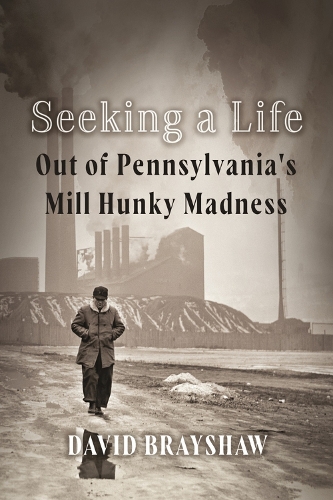
Seeking a Life: Out of Pennsylvania's Mill Hunky Madness
(Paperback)
Publishing Details
Seeking a Life: Out of Pennsylvania's Mill Hunky Madness
By (Author) David Brayshaw
BookBaby
BookBaby
2nd November 2023
United States
Classifications
Physical Properties
Paperback
218
Width 152mm, Height 228mm, Spine 15mm
358g
Description
After a highly devastating event in his youth, the writer, joined by his three siblings, is dragged with them through eastern American towns and cities by their nomadic parents whose alcoholism forces constant evictions. Seven schools in eight years he endured with a sojourn so pure and peaceable as to not be believed. Developments force his return to his unstable family, but eventually he grows to an age when he can determine his future. This is the story of his ever-evolving transformation.
Author Bio
From the worst day of his life, through eight years of a nomadic existence -- immersed in parental instability, alcoholism and violence -- through seasons of military enlistment, academic achievement and religious burnout, the author provides readers with a glimpse of what it is like coming to terms with brokenness. He boldly recalls events of the most turbulent years that carried him from one residence to another, one school to another, always with the same home environment to return to.
Life was for him a culture war. Born in perhaps the most industrialized region of the U.S., thirty miles north of Pittsburgh, Pennsylvania, where foundries, plants, factories and mills blanketed the landscape and where a culture of deep sarcasm, bigotry and limited education raised a society of hard drinkers in dirty attire. So dirty that all the landscape was covered with the dust and debris of blown stacks where kids played in the snow and where fathers refused to enter their homes before removing their disgustingly dirty attire. Fraternal organizations like the Elks, Moose, American Legions, and VFWs became the outlets for these men, many of whom spent more time in their favorite stool than they did at home.
This is the environment out of which this family fled following a horrific incident that devastated every member. Without realizing their responsibility, there was no care for the young, no therapy was suggested or considered because blue collar communities regularly resisted any thought of mental therapies. To have a member of the family committed to an asylum was too embarrassing to admit. And besides, children were understood to be resilient. They could bounce back in a blink, no matter the trauma they suffered. And yet, they had to exist, if only on their own terms.
Full of unflinching details, the writer is never preachy, even when Christian movements show up to lead him into new fads and foolish thinking and even when he provides advice to the struggling blue-collar sufferer. He chooses new roads when he is able and elaborates on a few truly surprising experiences that bring hope and laughter.
